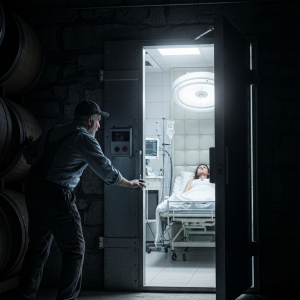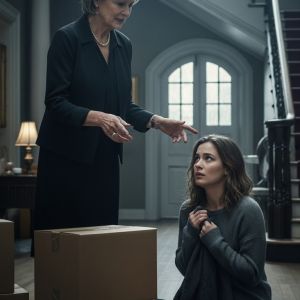The scent of roasting turkey, usually a comforting blanket over the house on Thanksgiving, felt thin this year. Carol moved through the familiar choreography of the kitchen alone, her movements precise and economical. Grief had stripped away the unnecessary, in both motion and in life. The grand floral centerpieces and catered side dishes of years past were ghosts, replaced by a simple vase of autumn leaves and bowls of potatoes she had peeled herself.
Her husband, Richard, had been a man who loved abundance. He believed life was a feast, and he had always insisted on providing one. Carol now understood that he had been serving a meal he could never afford, a banquet built on a foundation of sand.
The purr of a finely tuned engine, followed by another, announced the arrival of her children. Alex, at twenty-two, unfolded his lanky frame from a gleaming BMW, his expression already one of mild annoyance. His sister, Brianna, nineteen, emerged from her own pristine Audi, immediately pulling out her phone, her brow furrowed as she searched for a signal. They were the living embodiment of their father’s legacy: beautiful, confident, and utterly oblivious to the cost of anything.
“Hey, Mom,” Alex said, dropping his keys into a ceramic bowl by the door with a clatter. “Smells… different this year.” He meant quieter, smaller.
“Is the Wi-Fi down?” Brianna asked, not looking up from her screen. “I can barely get a signal. My stories won’t upload.”
Carol dried her hands on her apron, a strange calm settling over her. In the months since Richard’s sudden death, she had navigated a private storm of discovery, wading through a secret life documented not in letters, but in bank statements and credit card bills. The calls from creditors had been relentless at first. Now, she answered them with a crisp, unshakable resolve. Her tone was not that of a distraught widow, but of an executor closing a very messy estate. She was tired, but it was the weariness of a soldier after a long, hard-won battle, not the fatigue of despair.
Dinner was served at the long mahogany table their father had been so proud of. But instead of the usual groaning board—the prime rib, the lobster tails, the champagne—the offerings felt stark. A small, perfectly roasted turkey sat in the center, flanked by mashed potatoes, green beans, and a bowl of cranberry sauce from a can. It was a traditional, lovely meal. To Alex and Brianna, it was a disgrace.
They picked at their food, the silence thick with their unspoken disappointment. They had come home expecting the familiar comfort of excess, a reassurance that even with their father gone, the lifestyle he provided would remain. This meal was a jarring contradiction to that assumption.
Brianna pushed a green bean around her plate with her fork and let out a theatrical sigh. She held up her phone, aimed it at the turkey, then lowered it with a pout.
“This is it? Seriously?” she murmured, though her voice was loud enough for the whole table to hear. “I can’t even post this. It’s so… basic. What will people think?”
Alex, emboldened by his sister’s complaint, chimed in, gesturing at the modest spread with his fork. “Yeah, Mom. No offense, but this is a little… bleak. I thought Dad’s life insurance and investments were supposed to keep us comfortable. We’re not going broke, are we?”
The words, so casually cruel and deeply ignorant, landed in the quiet room. It was the final, thoughtless flick of a match, tossed onto a pile of kindling that had been drying for months.
Carol did not react. She did not cry, or shout, or defend herself. She simply stopped eating. She looked at her children, at their beautiful, ungrateful faces, and saw the full, devastating extent of their father’s irresponsibility. He had given them everything except a sense of reality, and the bill for that education was about to come due.
Her silence was a weapon. It grew, expanding to fill the space between them, becoming heavier and more accusatory than any words could be. Alex and Brianna shifted uncomfortably in their chairs, the taste of their complaint turning sour in their mouths. They mistook her quiet for grief-stricken fragility, assuming they had wounded her.
Slowly, deliberately, Carol placed her knife and fork down on her plate. The soft clink of silver against porcelain was unnervingly loud in the tense quiet. It was not a gesture of surrender. It was the sound of a judge picking up her gavel. Her expression was no longer that of a wounded mother; it was that of a CEO about to announce a company-wide restructuring that would leave no one untouched. Her children finally stopped eating, their full attention on her.
Carol folded her hands on the table and looked her son in the eye, then her daughter. When she finally spoke, her voice was devoid of anger or self-pity. It was calm, measured, and carried the chilling weight of absolute truth.
“I’m sorry,” she began, the apology a sharp, ironic twist of the knife, “if this meal isn’t up to the standard you’ve become accustomed to. I am truly sorry for that.”
She let the words hang in the air, a final moment of grace before the guillotine fell. Alex and Brianna exchanged a confused glance.
“This meal,” Carol continued, her voice steady as stone, “is what I can afford. It is what we can afford now.”
She paused, taking a small breath, gathering herself for the final, devastating blow.
“…because, as of the first of this month, I have stopped paying the enormous credit card bills that are in your names.”
The silence that followed was one of pure, uncomprehending shock. Alex and Brianna stared at her, their minds struggling to process the statement.
“What bills?” Alex stammered, a nervous laugh escaping his lips. “I don’t have any credit card debt. I pay my card off every month.”
“Not that card, sweetheart,” Carol said, her voice softening with a trace of pity. “Not the one with the thousand-dollar limit you use for gas and groceries. I’m talking about the others. The ones your father opened for you the day you each turned eighteen.”
The color drained from her children’s faces.
“That BMW you’re so proud of, Alex? It was leased on an American Express Platinum card in your name. That spring break ski trip to Aspen, Brianna? That was on a Visa Signature card in your name. Your downtown apartments, your designer wardrobes, your weekly dinners out… all of it. Your father paid for it all using your clean credit, your social security numbers.”
She leaned forward, her eyes holding them captive. “He built a palace for you on a mountain of debt, and he put your names on the deed. After he died, I found it all. I’ve spent the last six months legally separating my finances to protect what little I have left. And now… the bills are finally being sent to their rightful owners.”
The full, horrifying reality crashed down on them. They were not wealthy heirs experiencing a temporary dip in fortune. They were deeply, catastrophically in debt. Their entire adult lives were a fiction, written by their father and unknowingly co-signed by them.
“The repossession notices for the cars will likely go out next week,” Carol stated, her voice now purely factual. “The eviction process for non-payment of rent usually takes about thirty days. And the collection calls… well, those have already started. I’ve been forwarding them to your cell phones for the last two weeks.”
Brianna fumbled for her phone, her hand trembling. Her face went white as she saw the long list of calls from unknown numbers she had blithely ignored. Alex stared blankly at the half-eaten turkey, the symbol of his complaint now a monument to his own spectacular ignorance. They were about to lose everything.
Carol was finally free. The crushing weight of her husband’s financial secrets and her children’s endless demands was lifted. With the small life insurance policy Richard hadn’t borrowed against, she could live simply, quietly, and honestly. She could finally grieve the charming, reckless man she had loved, without also having to pay for his mistakes.
The shockwave sent Alex and Brianna into a brutal freefall. The cars disappeared in the night. The eviction notices appeared on their doors. Their credit scores, once pristine, were decimated. They were forced to sell their designer clothes and watches for pennies on the dollar, to move into cheap apartments with roommates, to find jobs waiting tables and stocking shelves. They were forced, for the first time in their lives, to grow up.
Three months later, on a cold Sunday evening, they appeared at Carol’s door. There was no BMW, no Audi. They had taken the bus. In Brianna’s hands was a slightly lopsided, but clearly homemade, apple pie.
They didn’t come to ask for money. They came to apologize. They sat in the kitchen, humbled and sobered, and asked their mother to teach them how to create a budget. They asked her how to talk to creditors, how to start rebuilding their shattered financial lives.
As Carol cut into the pie, she looked at her children—their clothes simpler, their eyes wiser, their hands a little rougher—and felt a surge of love and hope. Richard had given them a life of glittering illusion. By tearing it all down, she had given them something real: a chance. The foundation was destroyed, but now, together, they could finally start to build something that would last.
The half-eaten apple pie sat on the kitchen table, a humble peace offering. For the first time, the house did not feel like a courtroom or a battleground. It felt like a classroom, and class was about to begin. Carol didn’t coddle them or immediately absolve them of their fear. Instead, she retrieved three yellow legal pads and a pen for each of them.
“We start here,” she said, her voice practical, not punitive. “Everything you earn. Everything you spend. Everything you owe. We write it all down. The numbers won’t lie to you.”
For the next two hours, the kitchen was filled with the sounds of scratching pens and the sharp, pained intakes of breath from her children. Carol guided them, forcing them to access their online statements, to confront the brutal reality of their father’s hidden legacy. Alex, who had always excelled at math, stared at the numbers as if they were a foreign language.
“The interest rate on this card… it’s 28%,” he whispered, his face pale. He did the math in his head, the curse of his own quick intelligence. “That means the balance will double in less than three years if I only make the minimum payments. This isn’t a loan. It’s a financial death sentence.”
Brianna’s struggle was more visceral. Each line item was a memory, a piece of the identity she had so carefully curated. The $5,000 charge for the Aspen ski lodge. The monthly $300 for a designer clothing rental subscription. The countless $7 charges for artisanal lattes she had photographed and posted. Each one was a small nail in the coffin of the person she thought she was.
“But I needed those things,” she said, her voice small and cracking. “For my brand. For my followers.”
“Was your ‘brand’ paying the bills, Brianna?” Carol asked, her question not unkind, but unflinchingly direct. “Or was it just another thing your father’s debt was paying for? The person you are on the internet is a ghost. It’s time to decide who you want to be in the real world.”
By the end of the night, the final numbers were tallied at the bottom of their respective pages. Alex owed just over $92,000. Brianna’s debts totaled nearly $70,000. Staring at the sums written in their own handwriting, they finally understood. This was not a problem that could be ignored. It was an avalanche, and they were standing right in its path.
The weeks that followed were a brutal education in the currency of humility. Alex’s BMW was gone. His new mode of transportation was the 7:15 AM city bus, a crowded, humbling vessel that carried him to his new job as a clerk at a downtown accounting firm. The position was entry-level, the pay was modest, and it was the hardest he had ever worked in his life.
At first, he sat in the back of the bus, his head down, hoping not to be recognized. He felt a burning shame, a phantom limb where his luxury car used to be. But after a week, he started to notice other things. The tired faces of people heading to real jobs, the quiet dignity of their daily commute. He was no longer floating above the world in a leather-seated bubble; he was in it, and the experience was slowly, painfully, grounding him.
Brianna’s trial was social. Her friends, still living the life she had lost, invited her out for a weekend brunch at a trendy, expensive restaurant. A few months ago, she would have spent hours choosing the perfect outfit. This time, she looked at the text message, felt a pang of her old life, and typed out a reply that terrified and liberated her all at once.
“I’d love to see you all, but that place is a bit out of my budget right now. How about we grab a coffee and take a walk in the park instead?”
The replies were a swift, clean slicing of her social circle. Some sent back a curt “some other time.” Others left her on “read.” Two of her closest friends agreed. And as Brianna sat on a park bench that Saturday, sipping a simple black coffee she had paid for with cash from her waitressing job, she found that the conversation was more real than any she’d had over a $30 plate of avocado toast. She was losing followers, but she was finding friends.
She deleted her old Instagram account, with its thousands of photos of a life she hadn’t earned. She started a new, private one, and her first post was a slightly blurry picture of the apple pie she had made with her brother. The caption was a single word: “Home.”
It was April, five months after that fateful Thanksgiving. The mahogany table was set for three. The scent of roasted chicken filled the house, but this time it was joined by the smell of garlic bread that Alex had brought, and a fresh salad that Brianna had prepared. They didn’t just show up to eat anymore; they showed up to contribute.
The conversation was different. It wasn’t about what they wanted to buy or where they wanted to go. It was about what they had accomplished.
“I got a small raise,” Alex announced, a quiet pride in his voice. “It’s not much, but it’s enough to increase my monthly debt payment by an extra hundred dollars. My boss said he’s impressed with my work ethic.” He had never had a boss before, let alone impressed one.
“I’m signing up for a community college class,” Brianna said, her eyes bright with a new kind of excitement. “Graphic design. I’ve been doodling on the order pads at the restaurant, and my manager said I have a real eye for it. I think… I think I’d rather create things than just buy them.”
Carol watched them, her heart full. The journey ahead of them was still long and difficult. The mountain of debt remained. But they were no longer looking for an easy way out or for someone else to save them. They were looking at the mountain, and for the first time, they were learning how to climb.
She raised her glass of water. “A toast,” she said, her voice thick with emotion. “To paying our own way.”
Alex and Brianna raised their glasses. They clinked them together, the simple sound of glass on glass echoing in the quiet dining room. It was not the chime of expensive crystal, but it was the most beautiful sound in the world. It was the sound of a new beginning, earned and paid for in full.




